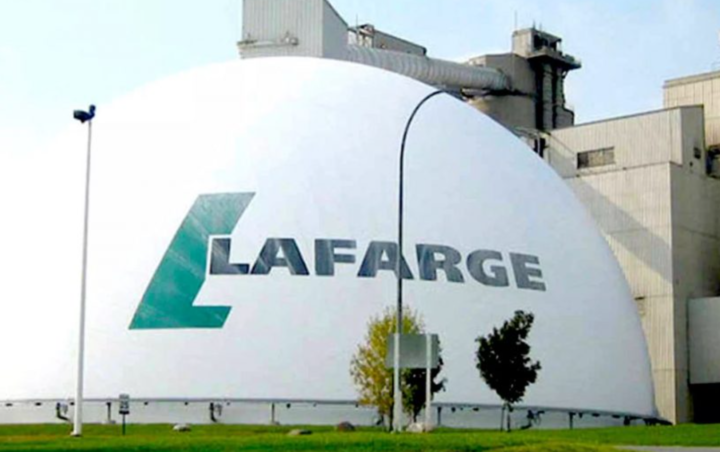Lafarge Africa Plc has announced a remarkable 144 percent rise in its profit after tax for the third quarter of 2025, reaching N75 billion compared to N30.7 billion recorded in the same period last year. The cement manufacturing giant attributed the impressive performance to increased production efficiency, cost management strategies, and higher sales volume driven by rising demand in the construction sector.
According to the company’s unaudited financial statement released to the Nigerian Exchange (NGX), Lafarge recorded a strong revenue growth of 58 percent, with turnover climbing to N450 billion from N284.7 billion in the previous year’s third quarter. This surge was largely due to increased cement sales across Nigeria, improved market share, and the ongoing infrastructure expansion by both public and private sectors.

The report revealed that Lafarge’s gross profit rose significantly to N122 billion from N78 billion recorded in Q3 2024, representing a 56 percent growth. The company said this was achieved through operational optimization, energy efficiency measures, and a deliberate shift towards local sourcing of raw materials to mitigate the impact of foreign exchange volatility.
Lafarge Africa’s Chief Executive Officer, Lolu Alade-Akinyemi, attributed the strong performance to disciplined cost control and resilient demand across its key markets. He said the company’s focus on sustainability, operational efficiency, and customer satisfaction had strengthened its competitive position in Nigeria’s cement industry.
“We are pleased to report a solid performance in the third quarter of 2025, reflecting the effectiveness of our strategic initiatives and operational discipline,” Alade-Akinyemi stated. “Our continued investment in production capacity, energy efficiency, and logistics optimization has positioned us to deliver long-term value to shareholders despite the challenging economic environment.”
He noted that Lafarge Africa has continued to prioritize sustainable growth by leveraging renewable energy and alternative fuel technologies. The company’s initiatives, he explained, were aimed at reducing its carbon footprint while maintaining cost efficiency.
Operating profit for the quarter stood at N98 billion, a 67 percent increase from N58.6 billion in the same period last year, while profit before tax rose to N83.4 billion, compared to N37.2 billion recorded in 2024. This performance reflects improved margins across the company’s product segments and effective risk management strategies despite inflationary pressures.
Industry analysts described Lafarge’s financial results as a testament to the resilience of Nigeria’s cement sector amid macroeconomic headwinds. They noted that the company’s ability to sustain profitability despite rising energy costs and currency fluctuations demonstrated sound management and robust demand for building materials.
“The growth in Lafarge’s earnings reflects the recovery in Nigeria’s construction and real estate industries. Demand for cement has remained strong due to ongoing infrastructure projects and private housing developments,” said an economist with the Centre for Industry Research, Dr. Femi Adebanjo. “With government spending on road and housing projects increasing, cement producers like Lafarge are likely to benefit in the coming quarters.”
In addition to its profit surge, the company also reduced its finance costs by 18 percent, aided by improved cash flow management and partial debt repayment. The statement further revealed that Lafarge invested heavily in production upgrades across its Ewekoro and Ashaka plants, which boosted overall production capacity and efficiency.
The company’s management stated that its strategic cost-reduction initiatives, including the use of local materials and alternative fuel sources such as biomass and waste-derived energy, helped cushion the effects of high import costs.
Lafarge Africa also reaffirmed its commitment to community development and environmental sustainability. Through its corporate social responsibility programmes, the company said it continued to support local communities with empowerment initiatives, health services, and infrastructure development projects.
Looking ahead, Lafarge expressed optimism that it would maintain its growth trajectory into the final quarter of the year despite macroeconomic challenges. “We expect demand for cement and building materials to remain strong, driven by government infrastructure projects and private sector construction activities,” the CEO noted.
The company also assured shareholders of continued value creation, stating that it would remain focused on operational efficiency, debt reduction, and dividend stability.
Meanwhile, investors on the Nigerian Exchange reacted positively to the Q3 earnings report, as Lafarge Africa’s share price rose by 4.6 percent in early trading following the announcement. The company’s market capitalization now stands at approximately N850 billion, consolidating its position among the top-performing industrial stocks in Nigeria.
Analysts project that Lafarge’s strong financial position could allow it to expand its market reach further, especially as it continues to explore opportunities in energy transition and sustainable building materials. The company’s parent firm, Holcim Group, has also reiterated its support for ongoing investments aimed at strengthening Lafarge’s operational base in West Africa.
Economic observers believe that if the company sustains its current momentum, it could surpass its full-year 2024 profit of N97 billion before the end of 2025. With cement demand showing no signs of slowing, Lafarge’s long-term growth outlook appears robust.
“The company’s emphasis on sustainability, efficiency, and innovation gives it a strategic advantage in a rapidly evolving construction landscape,” said Adebanjo. “As Nigeria pushes toward industrial growth and infrastructure renewal, Lafarge is well-positioned to play a leading role in that transformation.”
As the year draws to a close, Lafarge Africa’s management reiterated its commitment to maintaining a balanced approach between profitability and sustainability. The company said it would continue to align its operations with Nigeria’s economic development goals while meeting the expectations of shareholders and stakeholders alike.
Support InfoStride News' Credible Journalism: Only credible journalism can guarantee a fair, accountable and transparent society, including democracy and government. It involves a lot of efforts and money. We need your support. Click here to Donate
